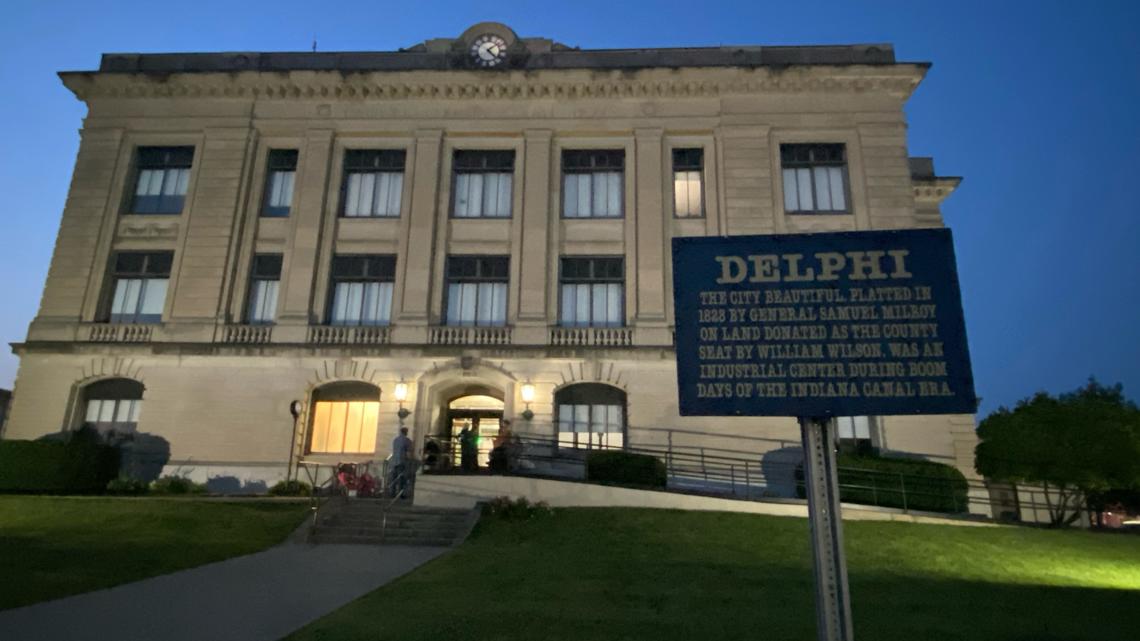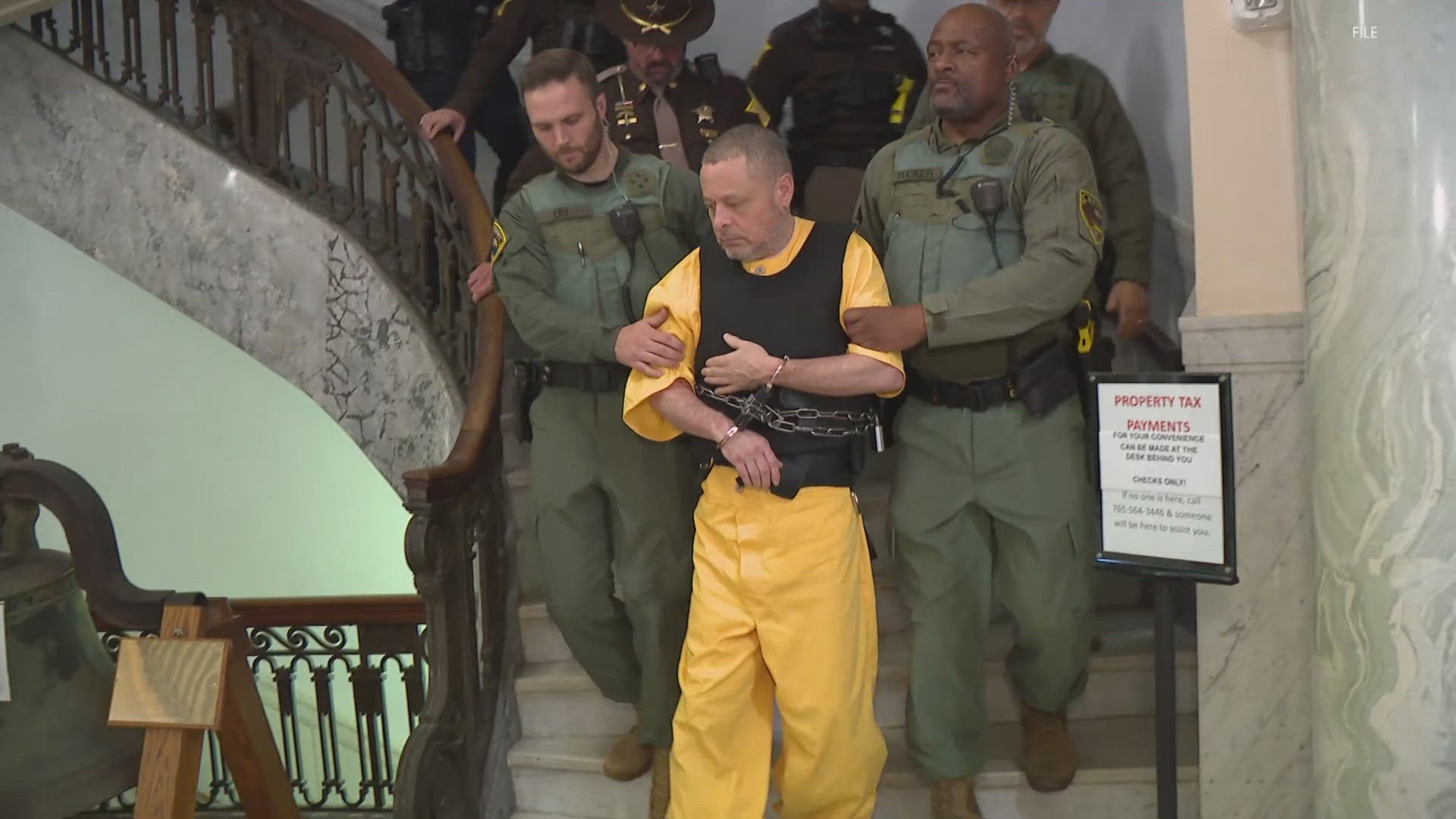DELPHI, Ind. — The judge in the Delphi murders trial is set to consider a series of key issues during a hearing this week.
Richard Allen is accused of killing Libby German and Abby Williams in Delphi, Indiana in 2017.
The hearing is scheduled for Tuesday, Wednesday and Thursday this week at the Carroll County Courthouse in Delphi.


Over several days, the judge will consider six main topics:
- Allen’s Safekeeping – Should he stay at an Indiana Department of Correction facility or move to a county jail before trial?
- Psychologist Statements - Whether statements from the IDOC psychologist can be used.
- Suppressing Allen’s Statements – Defense wants to suppress what he said while in custody before trial and what he said to ISP officer the day he was arrested.
- Discovery Issues – Defense wants to compel some discovery from prosecution and have prosecution sanctioned.
- What both sides can and can’t say in front of jurors without specific permission from judge.
- Defense request to dismiss the case
Safekeeping issue
Richard Allen's defense team is requesting to vacate the safekeeping order, which would move Allen out of IDOC custody. The defense is requesting Allen to be housed in either the Cass County or Tippecanoe County jail.
In July 2023, the judge denied a previous request to vacate the safekeeping order. At the time, she wrote, “it is reasonable and necessary to ensure the defendant's safety and to prevent serious bodily injury to himself.”
Psychologist statements
The State is asking for the judge to decide before the trial whether certain communications from Allen to the IDOC psychologist can be admitted.
The State said it believes some documented statements fall within an exception to confidentiality. It cites a portion of code saying information may be an exception in the followings circumstance… “(1) Trials for homicide when the disclosure relates directly to the fact or immediate circumstances of said homicide…”
Statements are documented in a report she titled: “Department of Corrections Behavioral Health Suicide Observation.”
Suppressing Allen's statements
The defense has two motions to suppress various statements.
The first motion to suppress deals with statements Allen reportedly made while in pre-trial custody. The defense wants to eliminate the possibility of prison guards or other inmates testifying about what they reportedly heard Allen say.
The second motion to suppress deals with statements made to ISP just before he was arrested. Oct. 26, 2022, Allen and his wife went to the police station in West Lafayette pick up a vehicle that was seized earlier that month. When they got to the station, Allen had a conversation with ISP officer Jerry Holeman. The defense wants the content of that conversation kept out.
Prosecutors object to both motions to suppress statements.
Motion to compel
The defense filed a motion to try to compel the State to turn over discovery and to do so without n a timely manner. They also are asking for sanctions against the State.
The Defense wants prosecution to provide a written explanation of what the defense says is a delay in providing evidence and why the prosecutor sent an email “filled with false statements and misled defense.”
Much of the motion details discovery the defense claims was turned over later than it should have been and, often, in a way that made it difficult to determine what is what.
The Defense wants four sanctions:
- For the Court to tell jurors the prosecution violated rules with a delay in turning over exculpatory evidence.
- Permit defense to play any video that was “belatedly produced” without State objection.
- Prevent the State from rebutting evidence former Rushville police chief Todd Click provided on May 1, 2023.
- Prevent the prosecution from using any data or info from Liberty German’s phone in evidentiary presentation.
Motion in Liminie
The State wants the Court to limit what the defense can mention in front of jurors without prior approval from the judge.
There are several pages of items. They include:
- Personal attacks on the prosecutor.
- Any attempt to introduce evidence of 3rd party motive that is not relevant or would unfairly prejudice jurors…. including mentions of Odinism, ritualistic killing, names of others the defense might claim are connected to the killings.
- Any mention of an investigation conducted by former Rushville Police Chief Todd Click.
- Some geofencing information.
- References to how discovery was handed over.
The Defense asked the Court for a hearing to “ensure a fair, efficient, and just determination of the facts to be presented to the jury…”
The State says establishing what is allowed at trial, before the trial, will clarify the scope of evidence and avoid long delays during the trial.
The Defense says approving some of these limitations would violate Allen’s constitutional rights.
The Defense also says it expects to present 12-24 witnesses to provide “relevant and credible” information related to third-party perpetrators.
Motion to dismiss case
The Defense wants the Court to dismiss the case – citing the 5th, 6th and 14th U.S. Amendment grounds as well as state constitution and Indiana law.
The request is based primarily on what it says is the State destroying or losing exculpatory evidence or potentially useful evidence for the defense.
The Defense also cites several times it believes the State tried to hide information that contradicted its investigators.
It also cites what it sees as long, unjustified delays in turning over discover and possible evidence, particularly items that might be favorable to Allen.
A first request to dismiss the case was filed in February 2024 on similar grounds. It was denied on April 2.
The Defense says it has learned of other evidence that the State “has not turned over to the defense, is missing or that the State of Indiana has destroyed.”
The State said there is no basis to dismiss the case.
The State says the defense motion is “replete with unfounded allegations and distorted and misinterpreted facts.” It claims it did not destroy or lose evidence purposely in bad faith.
The State says, “That the law is clear. A dismissal of charges due to the State destroying or losing evidence is only permitted when the evidence is materially exculpatory or when the evidence is deemed potentially useful to the defense and the destruction of the evidence was done in bad faith.”
The State says the Defense is speculating about some of the items it mentions and their value.

